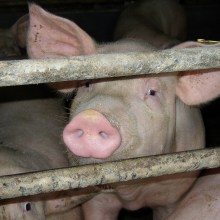
The unnecessary use of antibiotics in food-producing animals is endangering medicine’s ability to treat life-threatening infections in young patients, the American Academy of Pediatrics (AAP) warns in a new report. According to the authors, “The overuse and misuse of antimicrobial agents in veterinary and human medicine is, in large part, responsible for the emergence of antibiotic resistance. Approximately 80% of the overall tonnage of antimicrobial agents sold in the United States in 2012 was for animal use, and approximately 60% of those agents are considered important for human medicine.” The report says most of the use involves the addition of low doses of antimicrobial agents to the feed of healthy animals over prolonged periods of time to promote growth and increase feed efficiency or at a range of doses to prevent disease. “These nontherapeutic uses contribute to resistance and create new health dangers for humans,“ the authors warn, since this often leaves the drugs ineffective when they are needed to treat infections in people, especially in young patients. “Children can be exposed to multiple-drug resistant bacteria, which are extremely difficult to treat if they cause an infection, through contact with animals given antibiotics and through consuming the meat of those animals,” said lead author Jerome A. Paulson. According to the latest figures from the Centers for Disease Control and Prevention, at least 2 million Americans become infected with bacteria that are resistant to antibiotics and at least 23,000 people die each year as a direct result of these infections. For most types of infections reported, the highest incidence was among children younger than 5 years old. “Like humans, farm animals should receive appropriate antibiotics for bacterial infections,” Dr. Paulson said. “However, the indiscriminate use of antibiotics without a prescription or the input of a veterinarian puts the health of children at risk.” The pediatricians underline that urgent action is needed to make sure that antibiotic agents are used in food-producing animals only to treat and control infectious diseases and not to promote growth or to prevent disease routinely. However, the authors are concerned that a voluntary Food and Drug Administration initiative and measures proposed by members of Congress to reduce the drugs’ nontherapeutic use have met with opposition from the agriculture and farming industry. (ab)
